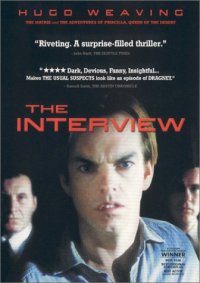|







|
|

Two minds... one truth
 Jurassic
Mark Jurassic
Mark
SCORE: 3
 Stars Stars

Movies about smart people are invariably more interesting
than movies about stupid people. Comedies occasionally break this rule
(including most of the Peter Seller's library). The Interview aims for the
crowd who enjoy films like The Usual Suspects. The Interview fails to
achieve the same level of the aforementioned film, but, presents a complex
plot, superb dialog, two great performances and a hypnotic musical score.
In a recent review (The Treasure of Alpheus Winterborn), I stated that
uber film critic Roger Ebert rarely speaks badly of actors. After watching
the Interview, I think I know why. One of my major problems with The
Matrix was the performance of our main baddy: Agent Smith (Hugo Weaving).
I thought Mr. Weaving's delivery was laughable. His similar appearance to
the other Matrix agents led me to believe he was cast more for his visual
"look" than any acting ability he might have.
Regarding his acting ability, I couldn't have been further from the truth.
Weaving was born in Nigeria in 1960, and moved to Australia in 1976. In
the Interview, he portrays an Aussie citizen accused of stealing a car
(and perhaps more). Weaving is absolutely brilliant. I never once thought
of his dreadfully miscast role in The Matrix. Weaving won both the
Australian Film Institute and Montreal World Film Festival awards for Best
Actor.
And, since we have a great performance from a suspect, we need a great
performance from a cop. The Interview doesn't disappoint, with Tony Martin
portraying a policeman who knows the game and intellectually matches
Weaving.
With all this praise, why only three stars? I guess the best way to answer
that question is to say that The Interview isn't completely plausible. To
comment further would destroy the plot. I don't want to do that because I
believe The Interview is a film worth seeing.
My only other complaint is the stylistic approach of director Craig
Monahan. I wished for a documentary approach rather than tilted camera
angles and unrealistic sets. David Hirschfelder's wonderful piano score
(reminiscent of The Usual Suspects) provides plenty of atmosphere to carry
us dramatically from scene to scene.
The Interview is complex because we don't always understand the conscious
choices made by the primary characters. In the end, however, it's hard to
ascertain what motivates cops and criminals. The Interview succeeds best
when it demonstrates that suspects can have their rights stripped by
police and that police can have their hands tied by red tape.
|